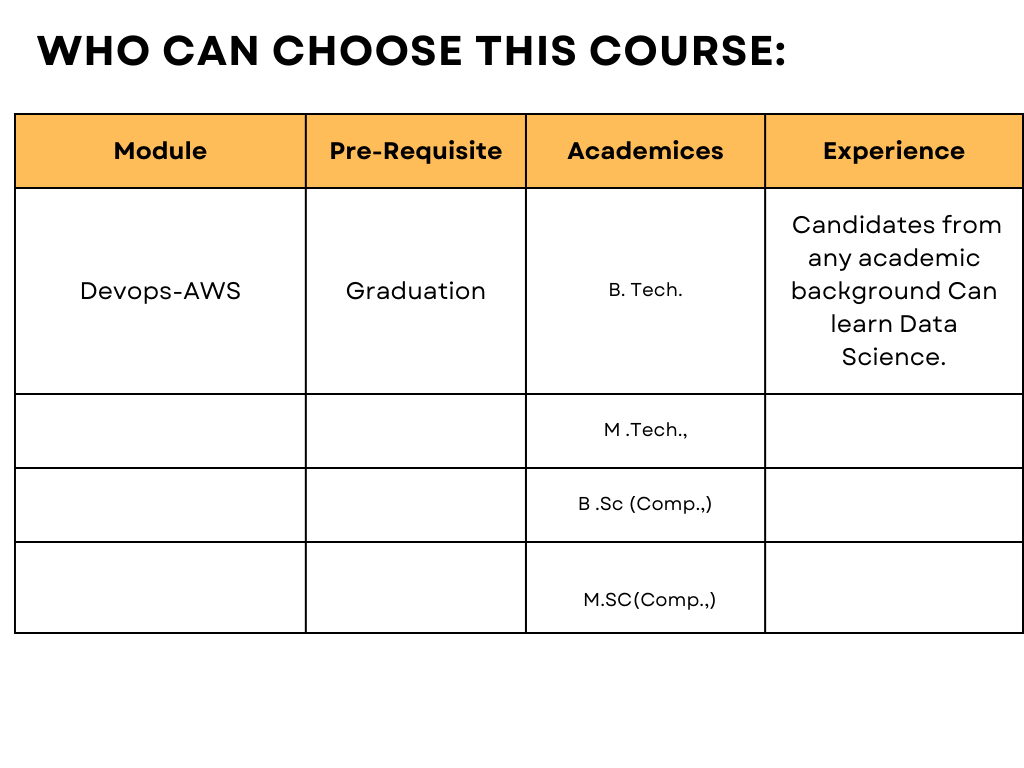Devops -AWS
DevOps-AWS is an end-to-end Software Development Platform that offers an assortment of capabilities intended to organize and accelerate development efforts across the entire Application Lifecycle.

Eligibility for a course typically depends on the following:
- Prerequisites: Required prior courses or skills.
- Level of Study: Undergraduate, graduate, or continuing education.
- Program Requirements: Specific to your major or program.
- Open Enrollment: Available to all students as an elective.
- Special Permissions: Might need instructor or department approval.
- Availability: Limited seats may give priority to certain students.
- Location/Delivery: Online or specific campus availability.
Check the course catalog or consult with an academic advisor for specifics.

AZURE – DEVOPS – COURSE CONTENT
Version Control System:
- Installation & Git configuration
- Branching strategy
- Git user workflow
- Branching & Stash
- Git commands (merge, pull, push, revert, reset etc.,)
- How to rectify conflicts
- How to create new pull request
Build Management:
- Understanding Build Automation
- Java Build system
- Understanding Maven architecture
- Maven Lifecycle & standards
- Building Node JS Application
- Building Golang Application
- Building Python Application
Deployment Tool (Tomcat):
- How to deploy java base application
- Integration with Jenkins
- Deployment application using Jenkins
- Deployment application using Ansible
Containerization:
- Understanding Containers Vs Virtual Machines
- Docker Architecture
- Get to know Docker Components
- Docker Installation & setup
- Docker Container Management – – Container creation, start, stop, renaming, logs, deletion, stats, events
- Docker Images
- Data Volumes & Port redirection
- Building Images Interactively using containers
- Docker file & its Instructions
- Deploying a Registry server
- Micro service Architecture
- Docker-Compose & configuration file
Deployment Orchestration (Kubernetes):
- Kubernetes Architecture
- Install and Configure Master Controller
- Install and Configure the nodes
- Kubectl: Exploring our Environment
- Create and Deploy Pod Definitions
- Tags, Labels and Selectors
- Deployment State
- Kubernetes Deployment Vs Stateful set Vs Daemon set
- Difference between Confirma’s Vs Secrets
- Good knowledge on PV & PVC
- Multi-Pod (Container) Replication Controller
- Create and Deploy Service Definitions
- Creating Pod Definitions
- Labeling Your Pod Definition
- Creating Temporary Pods at the Command line
- Interacting with Pod Container
- Logs, Auto scaling and Scaling our Pods
- Failure and Recovery
- Running a Command in Your Pod Containers
Helm Package Manager
- Package Management in Kubernetes
- Charts and Repositories
- Helm Releases
Kubernetes Advanced Concepts:
- How to Upgrade Node Group in production Environment
- Use of GasTOPS
- How to Setup GasTOPS Repo
- How to Setup Flux in Kubernetes
- How to deploy application with Flux CD
- How to deploy application with Helm CD
- Use of Customization and How to deploy application using Customization.
Continuous Integration, Continuous Deployment (Jenkins):
- Need of Continuous Integration
- Understanding Jenkins Architecture
- Master & Slave configurations
- Plugin Management
- Configuring different types of Jobs
- Security & Authentication in Jenkins
- Overview of popular plugins
- Jenkins Role based Authentication
- Integrate LDAP with Jenkins
- CI with code coverage, code analysis & continuous delivery
- Practical examples of different Jenkins use cases
- Jenkins Pipeline
- Backup & Restore of Jenkins jobs
- Migration of Jenkins
- How to integrate with Ansible
Cloud Computing (AWS Services):
- Understanding Cloud computing
- AWS Account Basics
- Identity & Access Management (IAM)
- Virtual Private Cloud (VPC)
- Simple Storage Service (S3)
- Elastic Compute Cloud (EC2)
- Elastic Load Balancer (ELB)
- Auto Scaling
- Relational Database Service (RDS)
- AWS Lambda
- API Gateway
- Amazon Cognito
- Simple Notification Service (SNS)
- Simple Queue Service (SQS)
- Simple Email Service (SES)
- Systems Manager Agent (SSM Agent)
- Elastic Container Registry (ECR)
- Elastic Container Service (ECS)
- ELK Stack: Elastic search, Logstash, Kibana
- Elastic Beanstalk
- Elastic File System (EFS)
Configuration Management Tools (Ansible):
- Ansible Setup
- Playbooks
- Ansible Vault
- Ansible Roles
Infrastructure As A Code (Terraform):
- Terraform Lifecycle
- Resources and Dependencies
- Variables
- States & Backends
- Loops & Modules
- Terraform Modules
- Providers, Provisioners, Data Source
- Integrating with Ansible
Monitoring Tools:
- Grafana
- Kibana
- Elastic Search, Logstash and Kibana
- AWS CloudWatch
Scripting Tools:
- Shell Scripting:
- Basic Commands
- User Management
- Group Management
- File Management
- Process Management
- Package Management
- Realtime Scripts
- Python Scripting:
- Installation
- Variable types
- Decision Making
- Loops
- Functions
- Real Time Scripts
Databases:
- Structural Databases:
- My SQL
- Post grew
- Non- Structural Databases:
- Mongo DB
Real-Time Scenarios:
Here we can do all topics with real time We provide links for practice on daily basis
Additional:
- Azure Cloud
- Azure Devops.
